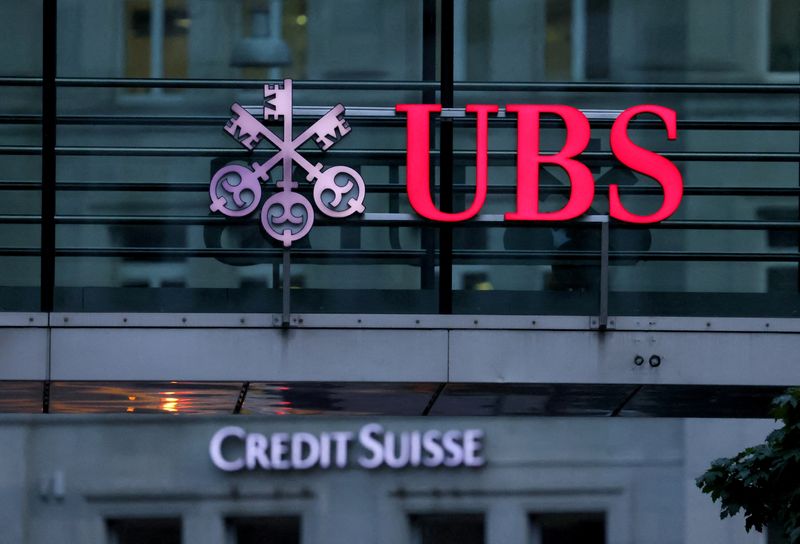By Stefania Spezzati and Oliver Hirt
LONDON/ZURICH (Reuters) - UBS is forging ahead with its integration of Credit Suisse (SIX:CSGN) but two key investors fear the Swiss bank could be on a collision course with regulators because of its size.
UBS took over its rival in a state-orchestrated rescue last year, creating a bank with a balance sheet of more than $1.6 trillion, nearly twice the size of the Swiss economy. Its shares are up about 50% since March, when the deal was announced, outperforming the Stoxx European Banks Index.
But shareholder service firm Ethos, which advises clients that in total own between 3% and 5% of UBS's shares, is concerned about the influence the bank could have on future banking regulation, potentially undermining Switzerland's ability to rein in risk-taking.
Another investor, a top 10 shareholder who spoke to Reuters on condition of anonymity, said the possibility of persistent conflict with Swiss regulators and lawmakers over the bank's size could hamper the smooth running of the lender.
For Switzerland, the stakes are high.
UBS dominates certain parts of the Swiss banking market, such as commercial lending, and could pose a risk to the economy should it get into trouble.
UBS's takeover of its rival triggered a debate about whether the too-big-to-fail regulatory framework that emerged from the financial crisis in 2008 is fit for purpose.
Globally systemically important banks -- such as UBS -- are required to plan for resolution, which should allow regulators to unwind them without broader systemic repercussions. Resolution for Credit Suisse was considered but not pursued.
In the spring, the Swiss finance ministry will submit to the parliament a review of the country's systemically important banks after the events in March last year.
"We are still very worried about the size of UBS in particular compared to the Swiss market,” Vincent Kaufmann, CEO of Ethos told Reuters.
"We see the potential distortion of competition in several businesses and a concentration of risks in certain activities."
Switzerland has a “too-huge-to-fail” issue now which requires "strong legislation and much more resources to the supervisory body," he added.
"Legislation should require stronger capital base. UBS will certainly lobby against that and its increased size will probably have a greater impact on the legislative process," Kaufmann said.
DERISKING
UBS said the focus on its balance sheet is misleading. It holds around 20% of total assets in highly liquid assets and another 15% in mortgages to retail and wealthy clients, which bear very low risks, it said in e-mailed comments to Reuters.
The bank's balance sheet will be further reduced over the next three years and "elements to prepare for a potential resolution are in place and will be further improved for the combined bank," UBS said.
Nevertheless, the challenge for UBS will be running a business which rewards investors but is also acceptable for regulators from a risk perspective, the top 10 shareholder told Reuters.
The Swiss finance watchdog FINMA and the central bank need to be comfortable with its business model, the top 10 shareholder said, otherwise there could be friction over the risks that a bank of its size poses.
If UBS wants to remain a Swiss bank, resolving the debate around regulation in its home country is a necessary condition, the top 10 shareholder said.
In the meantime, UBS should mitigate risks in its balance sheet, the person added, expressing confidence in the current management but also highlighting the need to prepare a sound succession plan.
CEO Sergio Ermotti has previously said he plans to stay at the helm of UBS through 2026.
FINMA, which has just appointed a new CEO, declined to comment when contacted by Reuters.
A Swiss National Bank spokesperson said that in view of UBS's greater systemic importance and the associated risks for Switzerland, the country's authorities must carry a thorough analysis and learn lessons from Credit Suisse.
Fears around UBS's size are "exaggerated," said SNB's chair Thomas Jordan during a TV interview late on Monday. "It needs proper regulation, good monitoring and good preparation,” he added.
REBUILDING TRUST
Regulators are still not prepared should UBS ever need public support, a senior policymaker involved in an emergency group set up by Swiss regulators for Credit Suisse in 2022, told Reuters, speaking on condition of anonymity.
In an interview with Swiss newspaper NZZ on Saturday, Swiss Life Chairman Rolf Dörig, said that the new UBS was "too big for the country. If UBS had to be rescued, it would be devastating."
But some investors are attracted to UBS's growth strategy, which will focus on the wealth business globally and on its retail and corporate banking operations in Switzerland.
Cevian Capital in December said it had built up a 1.3% stake, betting on a two-fold recovery of its shares.
"Once the integration is complete, the new bank will not be much bigger than the old UBS," Andreas Thomae at Deka Investment, which based on LSEG data holds 0.12% shares in the bank, said.

The integration is a multi-year task that will involve thousands of job cuts in Switzerland and elsewhere.
"By shrinking, UBS is also accommodating Swiss politics," Thomae said.